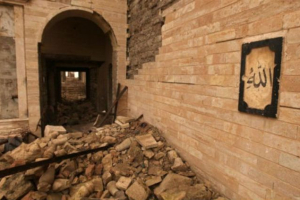Archaeologists said they've uncovered a biblical palace in Iraq after Islamic State extremists destroyed what is believed to be the tomb of Jonah, which was built on the palace.
"I've never seen something like this in stone at this large size," Prof Eleanor Robson, chair of the British Institute for the Study of Iraq, told Charisma News. "The objects don't match descriptions of what we thought was down there, so ISIL's destruction has actually led us to a fantastic find."
Historians believe the palace was built for Assyrian King Sennacherib, renovated and expanded by Esarhaddon (681 to 669 B.C.) and renovated again by Ashurbanipal (669 to 627). It was partly destroyed during the Sack of Nineveh in 612 B.C., according to the Telegraph.
Extensive excavation of the palace had been impossible, because sometime in the early Christian period, a church was built on top of the tell. At the end of the seventh century AD, the Christian Patriarch Henanisho I took up residence there after being deposed from his post, imprisoned, and thrown off a cliff by his captors. Crippled for life, he would be buried at the site upon his death in AD 701. The church was renovated by the Patriarch Sargis in the late ninth century. At some point, the tradition seems to have developed that the tell and the church on top of it marked the grave of the Biblical prophet Jonah.
The tomb of Jonah was a key figure in Christianity, Judaism and Islam. The holy site is said to be the burial place of the prophet Jonah, who was swallowed by a whale or great fish in the Islamic and Judeo-Christian traditions. The tomb was inside a Sunni mosque called the Mosque of the Prophet Yunus, which is Arabic for Jonah. This prayer was found beneath the Throne. The angels said to Allah, "O Lord! A faint known voice from a strange land (is detected)." He asked them, "Do you not recognize it?", "No, O Lord. Who is he?" He said, "My slave, Yunus."
The story of Jonah has special resonance for Christians, scholars Joel Baden and Candida Moss wrote in a piece on CNN's Belief Blog.
"In Christian tradition, the story of Jonah is an important one," they say. "Jonah's descent into the depths in the belly of the great fish and subsequent triumphant prophetic mission to Nineveh is seen as a reference to and prototype of the death and resurrection of Jesus."
Baden is professor of Hebrew Bible at Yale Divinity School. Moss is a professor of New Testament and early Christianity at the University of Notre Dame.
They refer to the destruction of Jonah's tomb as "an attack on both those Christians living in Iraq today and on the rich, if little-known, Christian heritage of the region."
Militants with the Islamic State in Iraq and Syria, or ISIS, planted explosives around the tomb and detonated them, civil defense officials there told CNN.
The book of Jonah tells the story of him resisting when God tells him to go to Nineveh to preach. Instead, Jonah sails in another direction, where he encounters a great storm and winds up being swallowed by a great fish. He spends a few days in the belly of the fish before emerging alive to follow God's instruction to go to Nineveh.

















